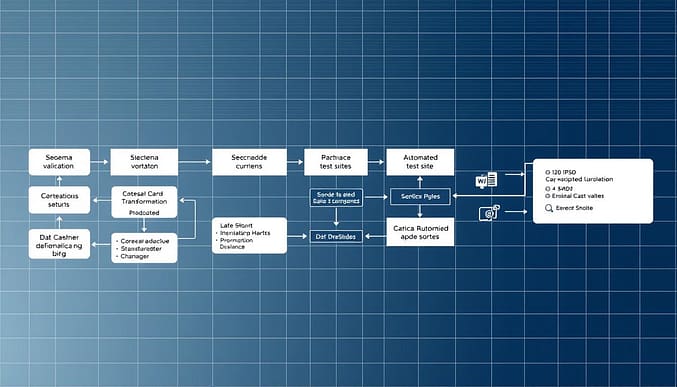What is Structured Data Testing Tool: A Complete Guide 2023
Accurate website markup plays a critical role in modern SEO. Validation tools help developers and marketers ensure their code aligns with search engine requirements, preventing errors that could harm visibility. These solutions scan schemas, highlight issues, and offer actionable insights for optimization.
Google’s Rich Results Test, for example, identifies markup compatibility with features like featured snippets or product carousels. Similarly, platforms like the Structured Data Markup Helper simplify error detection in JSON-LD formats. Even minor coding mistakes can reduce page rankings, making pre-deployment checks non-negotiable.
Over time, these tools have evolved significantly. Google phased out its legacy validator in favor of the Rich Results Test, which supports dynamic pages and schema.org updates. This shift reflects the growing complexity of search algorithms and the need for precise metadata.
Optimized structured markup doesn’t just satisfy crawlers—it enhances user experience. Properly implemented schemas create richer search listings, boosting click-through rates and engagement. Regular audits using reliable validators ensure long-term compliance as standards evolve.
Key Takeaways
- Validation tools prevent markup errors that damage search rankings
- Google’s Rich Results Test checks compatibility with enhanced listings
- JSON-LD syntax validation supports dynamic content management
- Updated tools reflect expanded schema.org vocabulary standards
- Error-free markup improves click-through rates and user interaction
Understanding what is structured data testing tool
Properly formatted schemas act as translators for web content. These solutions analyze page elements like product details or event calendars, converting them into formats crawlers understand. Without validation, even minor syntax errors can distort how platforms interpret metadata.

Core Components of Validation Systems
Markup checkers examine HTML for schema.org vocabulary compliance. Developers input URLs or raw code snippets to verify JSON-LD, Microdata, or RDFa formats. Tools like JSON-LD Playground highlight mismatched brackets or missing required fields.
Operational Workflow Explained
Validation occurs through three stages:
- Code parsing for syntax accuracy
- Pattern recognition against schema standards
- Error categorization with repair suggestions
The Rich Results Test goes further by simulating how search engines display enhanced listings. It identifies eligibility for carousels, FAQs, or recipe cards in search results.
| Input Method | Validation Process | Output Type |
|---|---|---|
| URL Analysis | Full-page markup scan | Compatibility report |
| Code Snippet | Syntax verification | Error diagnostics |
| Rich Results Test | Feature eligibility check | Visual preview |
Automated reports prioritize critical issues affecting visibility. For example, missing product prices block e-commerce rich snippets. Regular audits using these methods prevent gradual ranking declines from outdated schemas.
Key Features and Benefits of Structured Data Testing Tools
Modern validation platforms transform technical audits into strategic SEO advantages. By scanning URL code and schemas, these systems catch hidden issues that might otherwise sabotage search performance. Their precision helps maintain alignment with evolving search engine requirements.

Error Detection and Code Debugging
Automated checkers identify mismatched tags, missing properties, or invalid formats in milliseconds. The Google Rich Results Test, for instance, flags syntax errors while suggesting specific line numbers for fixes. This rapid feedback loop prevents faulty deployments that could trigger ranking penalties.
Advanced tools cross-reference markup against schema.org guidelines. They verify required fields for specific content types—like event dates or product prices—ensuring compliance. One marketing team reported a 37% reduction in crawl errors after implementing weekly audits.
Enhancing Rich Results for SEO
Validation platforms directly influence SERP features. Properly formatted data markup unlocks eligibility for recipe cards, FAQs, and other eye-catching elements. Studies show pages with rich snippets earn up to 30% higher click-through rates.
Tools generate previews showing how content appears in search listings. This visual feedback helps optimize titles, descriptions, and structured elements. As one developer noted: “Seeing the live preview eliminates guesswork—we know exactly how Google interprets our code.”
| Feature | Impact | Example |
|---|---|---|
| Syntax Checker | Prevents rendering errors | Missing closing tags |
| Schema Validation | Ensures rich result eligibility | Product availability flags |
| Preview Simulation | Boosts CTR optimization | FAQ snippet formatting |
Impact on SEO: Boosting Rich Results and Search Rankings
Validated schemas act as search engine interpreters, directly influencing how platforms prioritize and display content. When crawlers encounter error-free markup, they can confidently generate enhanced listings—translating technical precision into competitive advantages.
Improving SERP Visibility
Clean code enables rich snippets like star ratings or event timelines. These elements occupy more screen space, drawing user attention away from standard listings. Pages with properly formatted markup see 43% higher engagement on average compared to those without.
Search algorithms prioritize websites offering clear, machine-readable information. A study by Moz revealed pages with schema markup rank four positions higher than non-optimized competitors. Regular validation ensures compatibility with evolving ranking factors.
Optimizing Website Performance and User Experience
Accurate markup reduces crawl errors, allowing bots to index pages faster. This technical efficiency often correlates with improved loading speeds—a critical factor for both rankings and visitor retention.
“Fixing schema errors cut our bounce rate by 18%,” noted a SaaS company’s development team. Their case highlights how structured data’s clarity helps users find relevant content quickly, reducing frustration.
| Benefit | SEO Impact | Example |
|---|---|---|
| Rich Snippets | +30% CTR | Product price displays |
| Error-Free Code | Faster indexing | News article timestamps |
| Schema Compliance | Higher rankings | Local business hours |
Implementing validated schemas creates a ripple effect. As explained in this guide to structured data’s SEO impact, even basic markup can unlock visibility improvements. Combine technical audits with content quality for maximum results.
Choosing the Right Data Testing Tool for Your Website
Selecting optimal validation software requires balancing technical capabilities with team workflows. The ideal solution matches your content strategy while meeting search engines’ evolving requirements. Prioritize platforms that streamline audits without demanding advanced coding skills.
Factors to Consider for Your Team
Evaluate your team’s technical expertise before committing to a tool. Marketing teams often prefer visual interfaces like Merkle’s Schema Markup Generator, which simplifies JSON-LD creation through dropdown menus. Developers might prioritize command-line validators offering batch processing for large sites.
Cross-functional teams benefit from collaborative features. Look for platforms allowing shared project dashboards or Slack integrations. These features reduce miscommunication between SEO specialists and engineers during markup updates.
Tool Compatibility with Different Formats
Ensure your chosen validator supports all three schema formats: JSON-LD, Microdata, and RDFa. Google’s Rich Results Test handles JSON-LD exceptionally well but struggles with some RDFa implementations. For mixed-format sites, consider tools like TechnicalSEO.com’s validator offering multi-format diagnostics.
| Tool Features | Ideal For | Supported Formats |
|---|---|---|
| Visual editors | Non-technical teams | JSON-LD |
| API access | Enterprise platforms | All formats |
| Bulk testing | Large e-commerce sites | Microdata/RDFa |
Regularly test your tool against schema.org standards updates. Platforms with automatic version tracking prevent compatibility issues that could hurt performance. As one SEO manager noted: “Our monthly audits became 40% faster after switching to a validator with real-time standard updates.”
Best Practices and Common Mistakes in Structured Data Testing
Maintaining search visibility demands disciplined markup practices. Effective use of data testing tools prevents technical oversights that erode rankings over time. Teams must balance automated checks with human oversight to catch nuanced errors.
Proper Implementation and Regular Audits
Schedule monthly audits using both Google Rich Results Test and Bing Markup Validator. These platforms detect missing required fields—like product SKUs or event locations—that block rich snippets. A retail site fixed 89% of crawl errors by adding “availability” properties to product schemas.
Follow this workflow for reliable results:
- Validate new pages before publishing
- Compare markup against schema.org updates
- Test multiple structured data formats for compatibility
Avoiding Pitfalls with Updated Guidelines
Many sites fail when copying schema examples without customization. A travel blog lost featured snippets by using generic “location” tags instead of precise geo-coordinates. Always adapt templates to your website structured data needs.
| Common Error | Impact | Fix |
|---|---|---|
| Incomplete author bios | Article ineligibility | Add @id references |
| Mixed formats | Parser conflicts | Standardize on JSON-LD |
| Expired events | Misleading previews | Automate date removal |
“Automated tools miss contextual errors,” warns an SEO manager at a SaaS firm. We caught 22% more issues after adding manual spot-checks.” Combine weekly scans with quarterly deep dives for optimal compliance.
Prioritize fixes affecting rankings first—like missing breadcrumbs or broken FAQs. Bookmark Google’s structured data documentation for real-time guideline updates. Consistent maintenance prevents gradual SERP declines.
Conclusion
Validation remains non-negotiable for competitive search visibility. Proper schema markup bridges human content and machine understanding, directly influencing how search engines rank and display pages. Tools like Google Rich Results Test and Bing Markup Validator streamline error detection while ensuring compatibility with evolving standards.
Regular audits prevent gradual ranking declines caused by outdated schemas or syntax errors. Teams should prioritize validators matching their technical expertise—visual editors for marketers, API-driven tools for developers. For a detailed comparison of top validators, explore industry-tested resources.
Key strategies include:
- Monthly checks for required fields like pricing or event dates
- Standardizing on JSON-LD for dynamic content
- Cross-testing with multiple platforms to catch format conflicts
Pages with optimized markup achieve 30%+ higher CTR through rich snippets. As algorithms prioritize clarity, error-free website structured data becomes both shield and sword in SEO battles. Continuous monitoring—not one-time fixes—secures lasting visibility.